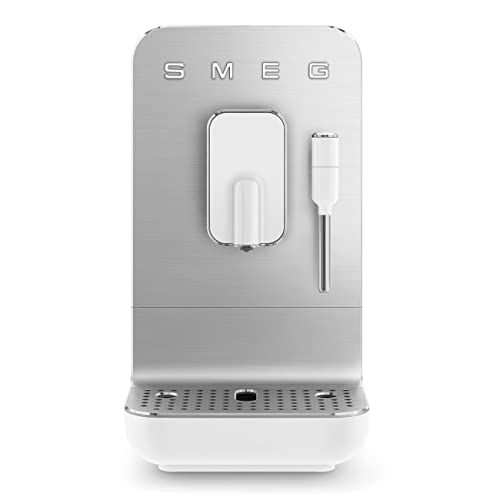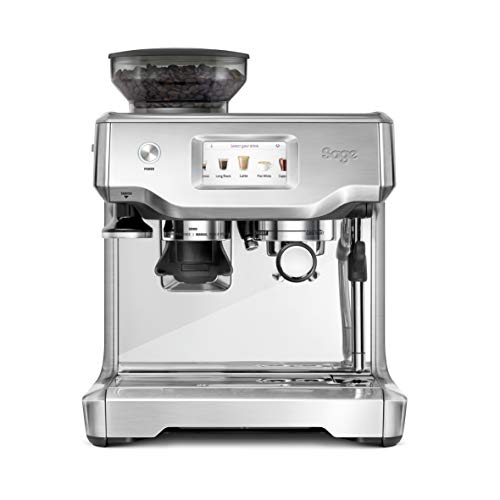Looking For Inspiration? Check Out Coffee Bean Coffee Machine
페이지 정보
작성자 : Constance Partr…
조회수 : 109회
작성일 : 24-09-03 22:54
본문
 Bean-to-Cup Coffee Machines
Bean-to-Cup Coffee MachinesBean-to-cup machines are great for those Monday mornings when you're exhausted and need to press a button. They provide a certain amount of flexibility for more adventurous drinkers.
They store the entire beans in a hopper, and grinding them prior to brewing. Then, they dispense a beverage with a touch of a key. They can serve both staff and customers, with out the requirement for a barista.
Cost-effectiveness
Whether you prefer the traditional taste of freshly ground beans or the convenience of pre-packaged coffee pods each type has pros and cons. Cost-effectiveness is the primary aspect. Bean-to-cup machines are the most affordable option for long-term use than pod-based models. You can avoid recurring costs by purchasing bulk, high-quality beans at a lower price than pods. In addition, they can cut down on waste by eliminating the need to dispose of coffee pods.
Bean-to cup coffee makers are perfect for office settings, as they're simple to use. Unlike manual, drip-style coffee makers that require users to grind beans and prepare them manually, bean to Cup espresso coffee machine-to cup machines provide a smooth, consistent coffee brew with the click of a button. In addition they're designed with minimal maintenance and cleaning in mind. Additionally, many have integrated cleaning and rinsing programs to allow you to ensure they are running smoothly.
The primary benefit of a bean-to-cup machine is its simplicity of use. It is usually simple to install and operate and requires no prior training to operate. It comes with a built-in grinder, and often includes an automatic milk frother which is ideal for businesses with limited staff. Furthermore, it can provide top-quality coffee at the touch of a button, which is convenient for busy offices.
While it is more expensive to purchase a bean-to-cup machine than a pod-based model, it can save money in the long run by reducing costs for supplies and lowering energy costs. It is also more environmentally green than pod-based machines as it produces less waste and uses less resources.
Coffee is a great way to boost morale and productivity. By providing a machine that makes coffee in the breakroom and creating an environment that encourages collaboration and teamwork. In addition it will encourage social interaction among your employees through informal conversations. In these discussions, employees can exchange their thoughts and come up with creative solutions to problems. A quick cup of coffee will also provide you with a boost of energy, and inspire your creativity.
Convenience
Bean-to cup coffee machines are an affordable way to provide high-quality coffee at the click of an button. They are simple to use and require minimal maintenance. They are equipped with grinders which ensure that your beans are freshly grounded for each cup. They can be programmed to make different drinks, such as hot and iced drinks, by pressing a button. You can create a wide range of drinks to serve your staff and customers.
Additionally, a bean to cup coffee maker can allow you to save money by removing the need for paper filters as well as plastic cups. It will also decrease the amount of coffee grounds end in the trash. If you are environmentally conscious, you can choose a coffee machine that uses whole beans that are organic to give the most sustainable experience.
Contrary to pod coffee machines that require a certain level of proficiency to operate, a bean-to-cup machine can be operated by anyone with a minimum or no knowledge. The user only needs to fill up the water tank as well as the bean hopper, then select the desired beverage from the machine's user-friendly control panel. Certain coffee bean machines allow you to alter the temperature and strength.
While pod coffee machines make use of powdered, pre-ground coffee, the bean to cup coffee machine grinds whole beans prior to making each cup of coffee. This keeps the aroma and flavor of the beans and results in a more authentic taste and texture. They are also able to adapt each cup of coffee to its user's preferences, allowing them to learn about their preferences throughout the day. Barista Smart is an excellent example of a machine like this. It is programmed for 21 different types, from espresso to black coffee.
A bean-to cup coffee machine can also run rinse cycles prior to shutting off and when first switched on, to help prevent the build-up of coffee residues on spouts and the milk dispenser. It also has an internal bin for leftover coffee grounds and milk. This bin doesn't need to be cleaned out every day and typically will have a visual prompt when it's full.
Freshness
Fresh-brewed coffee is not only delicious, but it also provides many health benefits. It can improve metabolism, reduce the risk of heart disease, and provide a natural energy boost. It is crucial to select the most suitable beans for your machine. Choose whole bean coffees with a clearly marked roast dates to ensure the best automatic bean to cup coffee machine quality and flavor for your coffee. This is especially important for bean to cup machines that require freshly-roasted, pre-ground beans. Using stale coffee beans can cause a loss of flavor and a bitter, unpleasant taste.
The shelf life of whole coffee beans is affected by several factors including temperature and storage conditions. Unopened bags of whole beans coffee machine can be stored for up to six months following roasting if properly stored. After the beans are ground, the shelf life of the beans decreases due the increased exposure to oxygen. In general it is recommended to use freshly-ground beans within two weeks after opening or grinding.
Another way to tell whether your coffee is fresh is by inspecting the appearance of the beans. Fresh whole beans will be shiny, whereas older coffee beans are dull and dry. The aroma of the beans may help you determine if they are fresh or not.
When coffee beans are roasted, they release volatile aromatic oil that imparts the flavor of the beans. These oils are the reason for the distinctive aroma of each coffee, and if they lose their potency, the taste of the coffee that is brewed will be affected. To avoid this, make sure you purchase coffee beans with an exact roasting date. keep them in an airtight jar.
It is also recommended to grind the coffee a few days before the date you intend to make it. This will reduce the oxidation process and ensure you enjoy the most flavorful coffee you can. Avoid storing beans that have been roasted in the refrigerator, as this can cause structural damage or moisture accumulation.
The hopper is an essential element of any bean-to-cup machine and must be cleaned regularly to remove excess dirt and water. Cleaning the hopper can help prevent blockages and improve the overall performance of the machine. It's as easy as taking the hopper off every day, washing it in hot water, then wiping the hopper with a soft cloth to remove any dust or buildup.
Sustainability
The most sustainable option is to purchase beans that have been cultivated and processed sustainably, regardless of whether you are using an instant cup, filter, or capsule. By choosing sustainable brands or purchasing beans that are UTZ or fair trade certified, you can reduce the amount of waste generated during roasting and packaging processes. These certifications ensure that the farmers who grow the beans are paid a fair wage and working conditions.
Coffee beans are the most significant contributor to greenhouse gas emission. It can be anywhere from 40% to up to 80%. This is because large companies make use of intensive irrigation, fertilizers, and pesticides to boost the yield of their crops. This causes deforestation, pollutes water sources, and kills different species. It also causes soil erosion to increase which reduces the quality of the land and causes climate change.
By selecting a bean-to- cup machine, you will be able to reduce your coffee's carbon foot print by avoiding the use of plastic cups and paper cups. You can go even further and share the machine with a friend to reduce the energy use. Another way to reduce the environmental impact of your coffee is to buy a sustainable refillable pod that is able to be used multiple times.
Espresso machines are more efficient now, thanks to the increased attention to sustainability. They use less electricity. Many of them are made from recycled materials, and you may even find ones that are 100 percent compostable. They will be biomaterials within the 84-day period after disposal. You can also avoid adding to the problem of waste by encouraging your colleagues to use reusable mugs as well as tumblers, as well as by offering coffee machine fresh beans grounds for composting. Donating to charities that support responsible coffee production is another way to help. In addition, you can reduce the environmental impact of your coffee by avoiding single-use accessories like stirrers and sugar.
